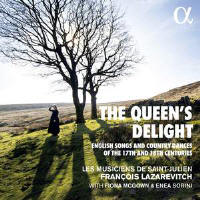Texte paru dans: / Appeared in: |
|||||||
|
Outil de traduction ~ (Très approximatif) |
|||||||
|
Reviewer: James
V. Maiello
In recent
years, I’ve noticed an increased willingness in early music toward including
folk and vernacular idioms on programs, as well as a more holistic approach
to the intersections between repertoire and cultural context. This has
resulted in a number of notable recordings and concert programs, with recent
projects by Jordi Savall and Anne Azéma coming to mind immediately. Here,
Les Musiciens de Saint-Julien have put together a disc of ballads and
country dances from early modern England that offers a fine selection of
music that was likely familiar to a broad cross-section of English society.
In general, they have taken tunes John Playford’s The English Dancing
Master, which appeared over 20 editions from 1651 until about 1728.
Successive editions removed some songs and dances to make room for new ones,
providing a rare window into subtly changing tastes over the late 17th and
early 18th centuries. François Lazarevitch is responsible for the
arrangements and adaptations, except for David Greenberg’s arrangement of An
Italian Ayre. Lazarevitch and the ensemble have been responsible for 12 recordings by my count (in addition to Lazarevitch’s work as a solo flutist), all presented with the same kind of careful attention to detail as the present album. They have chosen instruments that would been accessible to most demographics, including dulcimer, cittern, lute, harp, bowed strings, and flutes. The use of small pipes is a particularly inspired choice. These instruments are wielded here with considerably more virtuosity than one might find among many amateurs of the period. For example, Enea Sorini’s shimmering dulcimer performance of Emperor of the Moon/Ormond House is a highlight, and Lazarevitch is a masterful flutist and piper throughout. As an instrumental ensemble, Les Musciens de Saint-Julien play with a remarkable synthesis of technical precision, idiomatic fluency, and palpable enthusiasm. In addition to his service as a baritone and on the dulcimer, Sorini also offers up tasteful and intelligent percussion improvisations throughout. Solo playing is consistently top-notch, especially from the strings. The players are responsive and dependable accompanists, especially in more delicate songs like The Witty Western Lasse and Drive the Cold Winter Away. Fiona McGown’s voice is ideal for this music, her rich mezzo-soprano both sweet and earthy as appropriate. The choral singing is clean, but the authenticity has not—thankfully—been polished away. There is
something refreshing and inviting about this recording. The program is
engrossing, moving seamlessly through a diverse slate of songs, dances, and
other varia. The constantly changing textures, styles, and instrumentation
keep things from stagnating. Given the similarities in musical style in
genre among the selections, this is a perceptive decision, and certainly a
carefully considered one. The overall effect is perhaps like stepping into
an English pub on a Saturday evening circa 1700, albeit with a higher
quality of music-making than might be the norm. The music is accessible, and
the performances committed and fashioned expertly. Very highly recommended.
| |||||||
|
|||||||
|
|
|
||||||
|
Cliquez l'un ou l'autre
bouton pour découvrir bien d'autres critiques de CD |
|||||||




